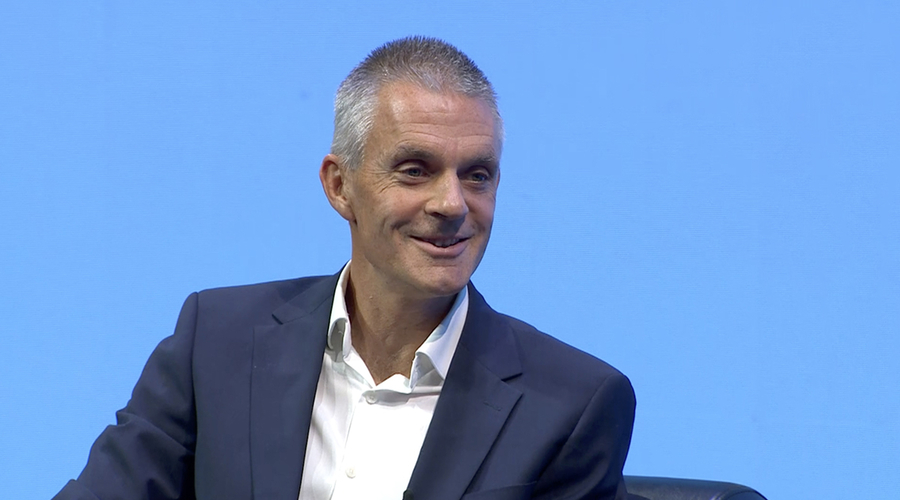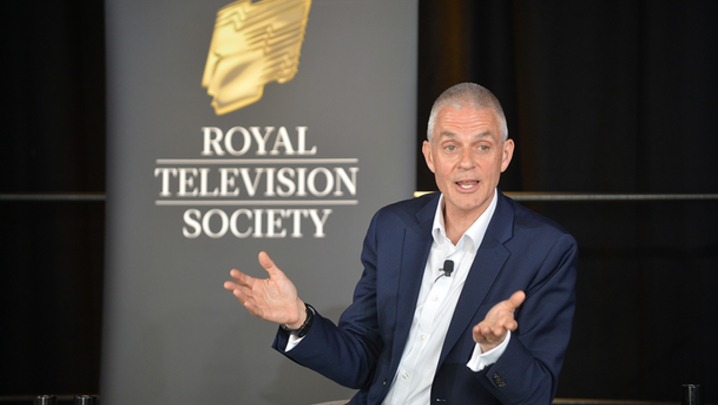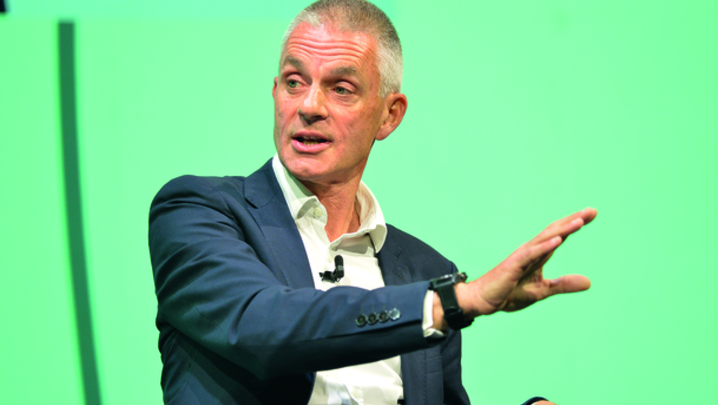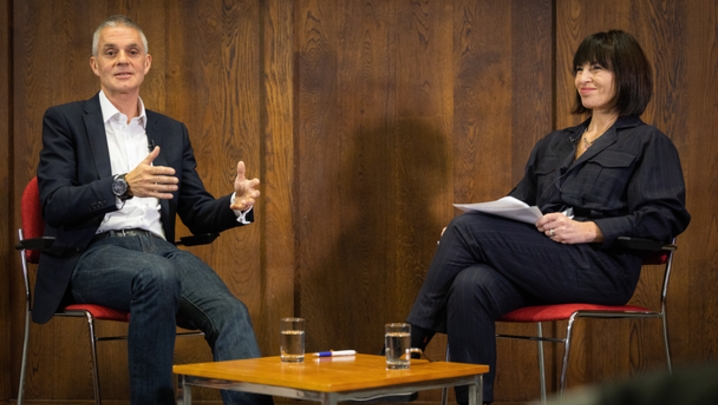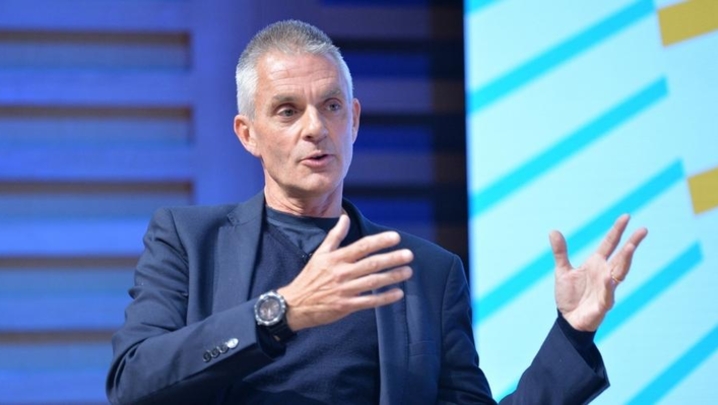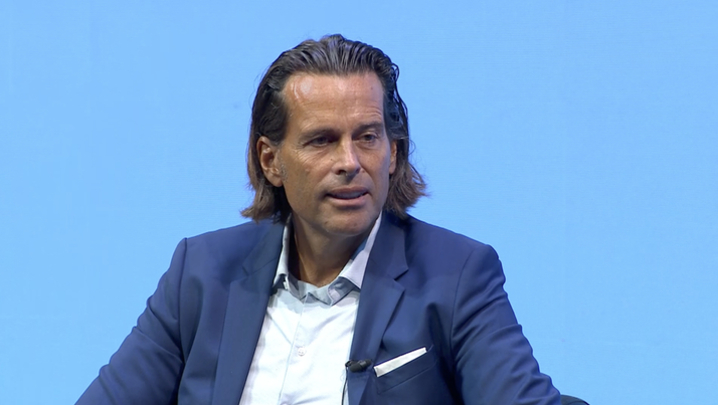The Director-General talks up the BBC’s value for money and impact in the creative sector
If the surprise appointment of the new culture secretary, Nadine Dorries, an outspoken critic of the BBC, had ruined Tim Davie’s day, he wasn’t letting on during what was his first RTS Cambridge appearance since succeeding Tony Hall as Director-General a year previously.
Throughout a 30-minute grilling by ITN’s newish CEO, Deborah Turness, the former head of BBC Studios presented a glass-half-full view of life running an institution that often appears embattled as it is attacked by the Daily Mail or Westminster.
For the ebullient Davie, it all felt like water off a duck’s back. On the question of Dorries taking over DCMS – she has described the BBC as “outdated” and “bloated” – Davie said he was “looking forward to meeting her and getting stuck in”.
Did her appointment tell him anything regarding the Government’s intentions over the licence fee? “It’s too early to draw any conclusions. We’re on 10 culture secretaries in 10 years,” said Davie. “The key thing I found is that we need a really serious, grown-up dialogue with government to talk about what we want to do with this industry, and the BBC’s place in it.”
The DG continued: “There is a very strong case for investment in the BBC [the past year had seen 1,200 jobs lost on the public service side of the corporation]. There’s a lot of jeopardy for us now. Politicians’ decisions are going to shape the industry.… We need to have a dialogue at a slightly different level. That’s why I really appreciate this conference.”
Had the appointment of Jess Brammar – known for her anti-Brexit tweets – as executive editor of the BBC’s news channels confirmed the suspicions of those who are sceptical of the BBC’s political impartiality? “We’re on dangerous territory if previous political positions and tweets rule you out from BBC jobs. We are hiring people from all walks of life, and from a wide spectrum of media,” he replied.
“My expectation as leader of the organisation is for anyone joining our organisation to leave their politics at the door...
“What I don’t want to do is [end up in a place where] we’re not in a position to hire the best people. When you come to the BBC – and I’ve made this very clear – you deliver impartial coverage.”
Could Andrew Neil return to the BBC? “He’s an outstanding talent. I am sure he will get a good gig.”
What, then, did it feel like leading the BBC? When Davie started the job, a source was quoted in The Sunday Times saying, “Every day you open Pandora’s box and more bad stuff comes out.”
Was that true? “No. You don’t choose it for a quiet life. Rarely is there 24 hours without something coming up that could absorb your day.
“At the end of the day, we’re in a market and I happen to be a huge advocate of this rather wonderful blend of private money and public intervention. It’s not a coincidence that the UK creative industries are one of our crowning jewels economically and culturally.”
He added: “Sometimes it’s difficult in this job because there’s so much noise.” It was vital to be driven by audiences and household behaviour, which is what Davie said he focused on instead of “the industry stuff”.
The new DG had arrived in the hot seat with four key priorities – a renewed commitment to impartiality, a focus on high-impact content, a determination to extract more from online, and to build the BBC’s commercial income.
He told the RTS that these objectives were all served by ensuring that the corporation’s services were valued by every UK household. “It’s not enough for people to think the BBC is a good thing for the country. They’ve got to feel they’re getting good value,” Davie said.
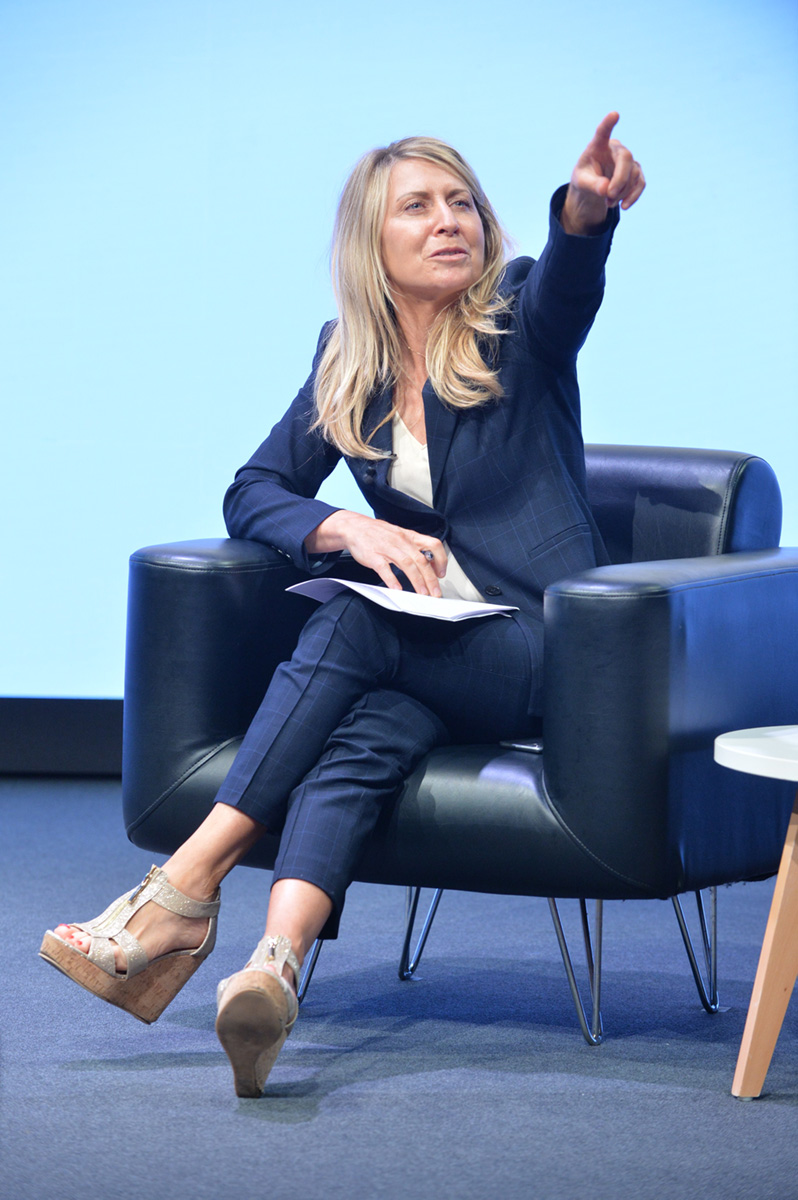
On impartial news, he was pleased with how the BBC had covered the regional and local elections in May, and of how “we navigated the Covid crisis”.
“As for high-impact content, we’ve had some rather good things going on,” he noted. “Eighty-nine per cent of the UK population uses the BBC each week, for around 18 hours on average; iPlayer has had an excellent year while Sounds has grown at reasonable scale.
“Commercially, we’re doing OK. It’s been a tough year but, so far, BBC Studios has hit all its numbers. I’m very ambitious about where that business could go.”
But with the BBC having reduced its Olympics coverage after being outbid by Discovery, and losing top talent such as Phoebe Waller-Bridge to Amazon, wouldn’t there come a tipping point where the value to users wasn’t there any more because you didn’t have the scale and the funds to deliver it? “No,” he insisted. “That’s not inevitable. I do think it requires a clear focus on what you’re trying to do.
“We push money out across the UK because that’s one of the things that differentiates us.” He welcomed MP John Whittingdale’s idea that UK PSBs should be obliged to make “distinctly British shows”, while observing that the Britishness narrative could be problematic when it got into “fun and games with flag-waving”.
“We’re great storytellers in the UK, we know it,” said Davie. “We tell stories. We have an incredible heritage that is globally recognised. We should focus on what we do differently and what we do better. [But] it is important that there isn’t a lack of global ambition.”
Culturally, the threat to the BBC came when “we’re not soaking up those [British] ideas and talent. When you see a Normal People.… You can write all the strategy documents in the world but when you see something like Normal People, you know you’ve got something great.”
But wasn’t there a terrifying truth staring down at all of us – by 2030, the top three US streamers would be spending £200bn a year on content? Where did that leave the BBC?
“Scale is a factor,” conceded Davie, “but it is not the only factor… we’ve got enough scale to compete if we make the right choices. Part of that is constructing partnerships and ensuring that we have access to capital. Ideas should not be constrained by the ability to fund them.
“As a nation, we’re very strong editorially. That gives us incredible power.”
When regulators cancelled Project Kangaroo, was it a sliding-door moment for the BBC and other PSBs? “It’s a moment we look back on with regret, but I don’t think the game is over.”
BritBox, Davie said, was a profitable, growing business gaining relative scale, having recently launched in Australia and South Africa. This offered real opportunity, as did BBC Studios’ distribution business, which was worth “half a billion odd”.
“At some point, what’s your ambition, to flip into direct-to-consumer?” teased Davie. “There are opportunities potentially in terms of subscription news services in the US. I’ve got other ideas around that. But you’ve got to be clear about who your partners are and what’s really going to work.”
Going forward, a creative ambition was a major priority: “We’ve got one life, let’s have some fun.… I want people to take more risks in the right way.… If you work at the BBC, surely you want to look back and think, ‘I’ve had the most amazing creative period’.
“I suspect we won’t remember the policy Zoom calls, but we will remember the work. I am going to be unrelenting in getting everyone to dial up their creative energies at the BBC.”
Session Eleven: ‘UK keynote: Tim Davie’. The BBC Director-General was in conversation with Deborah Turness, CEO of ITN. The producers were Sue Robertson and Martin Stott. Report by Steve Clarke.

